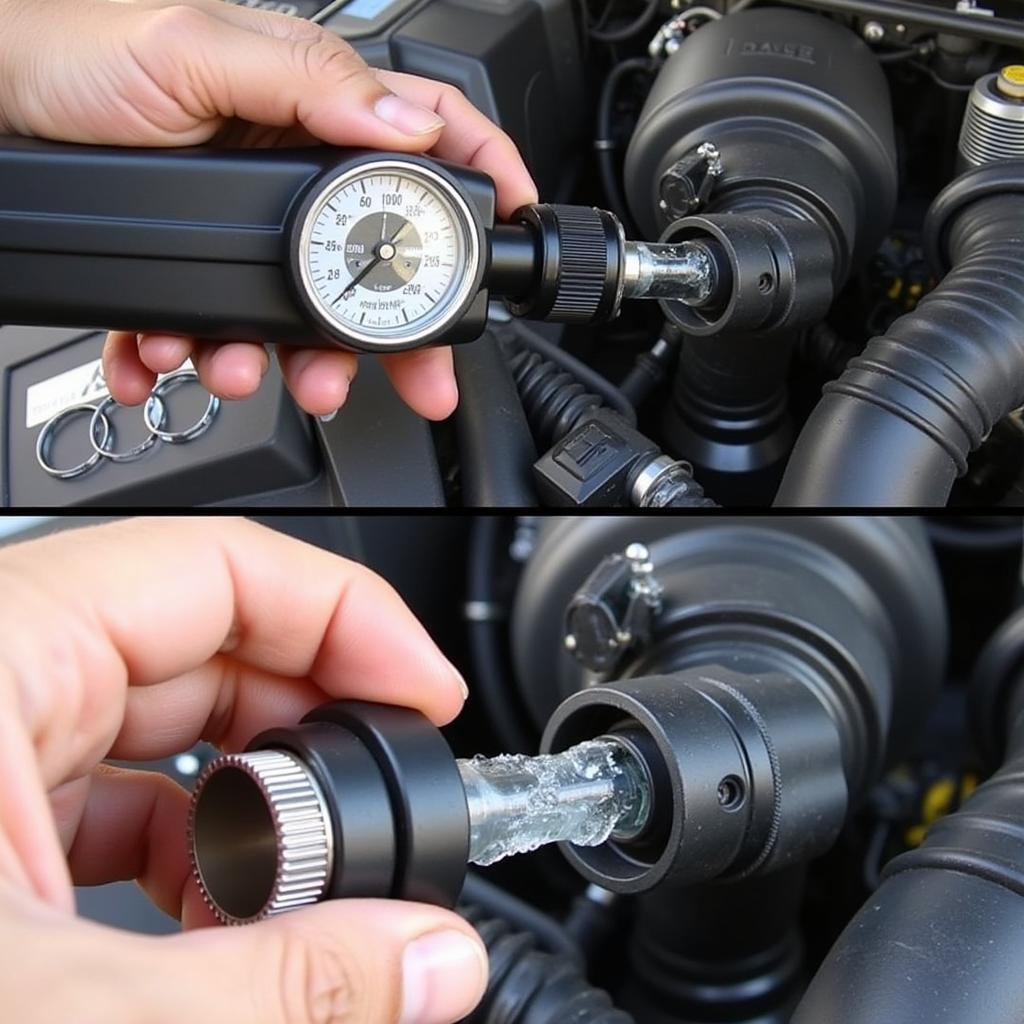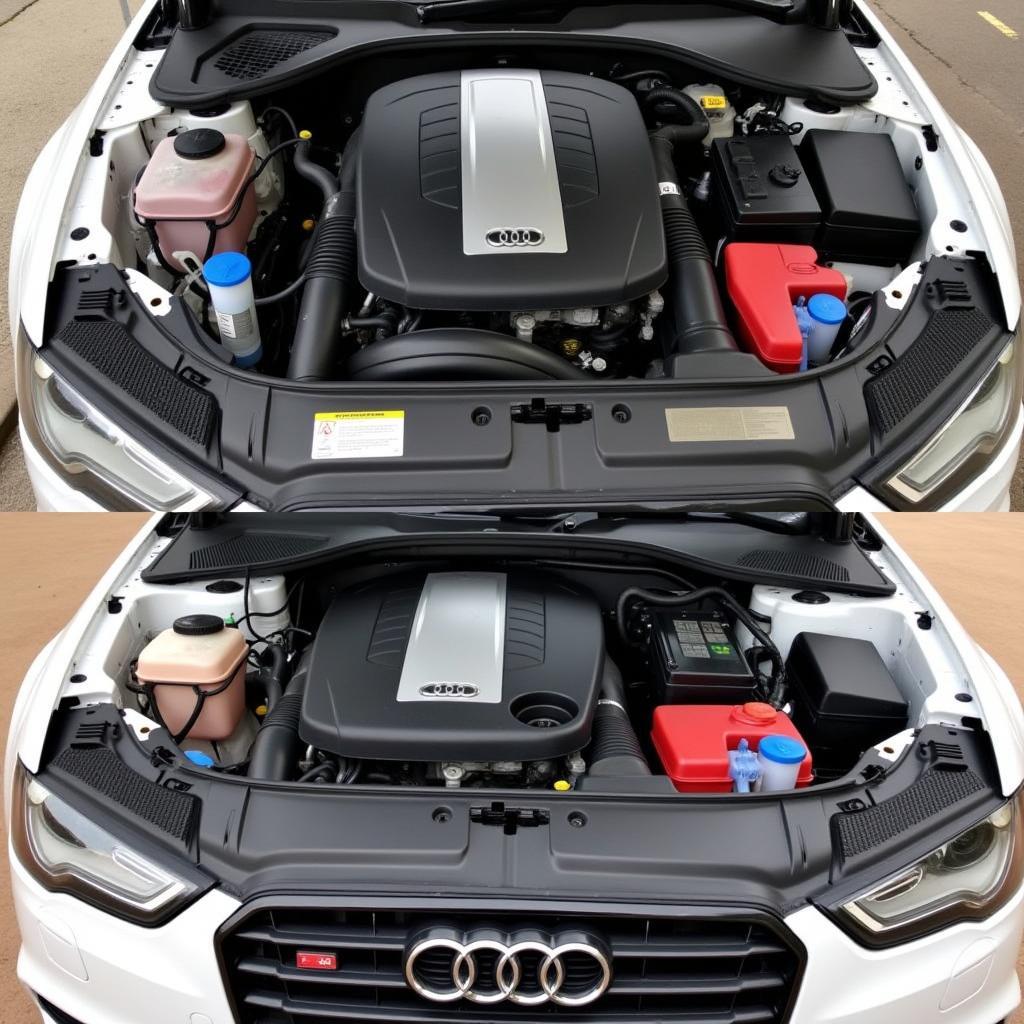Your cart is currently empty!

Audi A4 2.0 TDI Fault Code P0299: A Comprehensive Guide
The dreaded P0299 fault code. If you’re an Audi A4 2.0 TDI owner, seeing this code pop up on your diagnostic scanner can be a real headache. This comprehensive guide tackles everything related to the Audi A4 2.0 TDI fault code P0299, from its causes and symptoms to diagnostic procedures and solutions, empowering you to take control of the situation. We’ll dive deep into the technical aspects while keeping it straightforward, so whether you’re a seasoned mechanic or a DIY enthusiast, you’ll find this guide valuable.
What exactly does the P0299 fault code mean? It signifies “Turbocharger/Supercharger Underboost Condition,” indicating that your turbocharger isn’t delivering the expected boost pressure. This can lead to a noticeable drop in performance and overall driving experience. For more information on Audi fault codes, check out our resource on audi a4 fault codes.
Understanding the P0299 Fault Code in Your Audi A4 2.0 TDI
The P0299 fault code can manifest in various ways, affecting the performance and drivability of your Audi A4 2.0 TDI. Let’s explore the common symptoms and why they occur.
- Reduced Engine Power: The most noticeable symptom is a significant decrease in acceleration and overall engine power. Overtaking becomes challenging, and the car feels sluggish.
- Limp Mode: In severe cases, the car might enter “limp mode” to protect the engine from further damage. This severely restricts engine performance.
- Black Smoke from Exhaust: Incomplete combustion due to insufficient boost can result in black smoke emanating from the exhaust pipe.
- Unusual Turbo Noises: Whining, whistling, or rattling sounds from the turbocharger area could indicate underlying issues.
- Check Engine Light: The check engine light will illuminate on your dashboard, prompting you to investigate the problem with a diagnostic scanner.
These symptoms indicate a problem with the turbocharging system and should not be ignored.
What Causes the Audi A4 2.0 TDI Fault Code P0299?
Several factors can trigger the P0299 fault code in your Audi A4 2.0 TDI. Pinpointing the exact cause requires a systematic diagnostic approach.
- Faulty Turbocharger: Internal damage to the turbocharger itself, such as worn bearings or damaged vanes, can restrict boost pressure.
- Boost Leaks: Leaks in the intake system, intercooler, or hoses can cause a loss of boost pressure.
- Wastegate Issues: A malfunctioning wastegate, which regulates boost pressure, can lead to underboost conditions. This could be due to a faulty actuator or sticking valve.
- Clogged DPF: A blocked Diesel Particulate Filter (DPF) can restrict exhaust flow, impacting boost pressure.
- Sensor Problems: Faulty boost pressure sensors or MAF (Mass Air Flow) sensors can provide incorrect readings to the ECU, leading to the P0299 code.
- Vacuum Leaks: Vacuum leaks in the hoses connected to the turbocharger control system can disrupt boost regulation.
- ECU Issues: While less common, a faulty Engine Control Unit (ECU) can also contribute to this problem.
For specific information regarding your Audi A4 2.0 TDI’s engine code, refer to our detailed guide on audi a4 2.0 tdi engine code.
Diagnosing and Fixing the P0299 Fault Code: A Step-by-Step Guide
Here’s a step-by-step approach to diagnosing and fixing the P0299 fault code in your Audi A4 2.0 TDI.
- Scan for Codes: Start by using a diagnostic scanner to confirm the P0299 code and check for any other related codes.
- Visual Inspection: Carefully inspect all turbocharger and intake system components for any signs of damage, leaks, or loose connections.
- Check for Boost Leaks: Perform a boost leak test to identify any pressure leaks in the system. This typically involves pressurizing the intake system and listening for leaks.
- Inspect the Wastegate: Check the wastegate actuator for proper movement and ensure the valve is not sticking.
- Check the DPF: Inspect the DPF for clogging and consider cleaning or replacing it if necessary.
- Test Sensors: Use a multimeter to test the boost pressure sensor and MAF sensor for accurate readings.
- Inspect Vacuum Lines: Check all vacuum lines for leaks or damage.
 Performing a Boost Leak Test on an Audi A4 2.0 TDI
Performing a Boost Leak Test on an Audi A4 2.0 TDI
Once you’ve identified the cause, you can proceed with the appropriate repair. This might involve replacing faulty components, repairing leaks, or cleaning the DPF.
Expert Insights on the P0299 Fault Code
“The P0299 code can be tricky,” says John Miller, a seasoned automotive technician with over 20 years of experience specializing in European vehicles. “It’s crucial to perform a thorough diagnostic process to avoid unnecessary part replacements.” He further emphasizes the importance of addressing the root cause rather than just clearing the code, as this will likely lead to the issue resurfacing.
Another expert, Sarah Chen, a specialist in diesel engine diagnostics, points out that “regular maintenance, including timely DPF cleaning and air filter replacements, can significantly reduce the likelihood of encountering the P0299 code.” Preventive maintenance is key to keeping your Audi A4 2.0 TDI running smoothly.
Conclusion: Tackling the Audi A4 2.0 TDI Fault Code P0299
The Audi A4 2.0 TDI fault code P0299, while potentially daunting, can be resolved with a systematic approach. By understanding the possible causes, symptoms, and diagnostic procedures, you can effectively address this issue and restore your car’s performance. Don’t hesitate to reach out to us at VCDS Tool for further assistance. You can find more information on the audi p0299 fault code. Our contact information is: Phone: +1 (641) 206-8880 and our email address: vcdstool@gmail.com and our office is located at 6719 W 70th Ave, Arvada, CO 80003, USA.
 Audi A4 2.0 TDI Engine After P0299 Fix
Audi A4 2.0 TDI Engine After P0299 Fix
You can also check out our resource on audi a4 b8 2.0 tdi engine code for more specific information about the B8 generation. Or if you’re interested in other Audi models, have a look at the audi tt engine code page.
by
Tags:
Leave a Reply